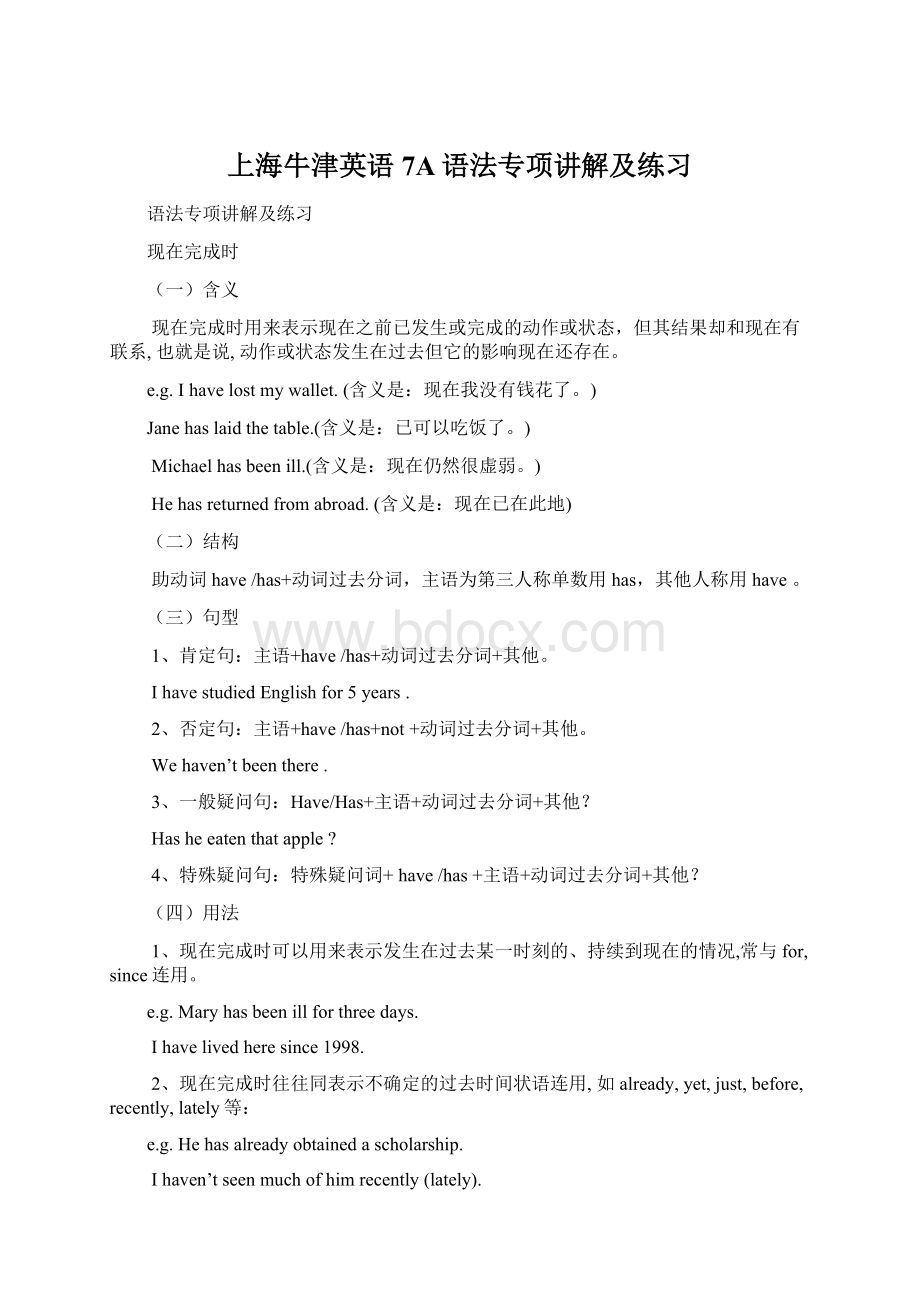上海牛津英语7A语法专项讲解及练习.docx
《上海牛津英语7A语法专项讲解及练习.docx》由会员分享,可在线阅读,更多相关《上海牛津英语7A语法专项讲解及练习.docx(34页珍藏版)》请在冰豆网上搜索。

上海牛津英语7A语法专项讲解及练习
语法专项讲解及练习
现在完成时
(一)含义
现在完成时用来表示现在之前已发生或完成的动作或状态,但其结果却和现在有联系,也就是说,动作或状态发生在过去但它的影响现在还存在。
e.g.Ihavelostmywallet.(含义是:
现在我没有钱花了。
)
Janehaslaidthetable.(含义是:
已可以吃饭了。
)
Michaelhasbeenill.(含义是:
现在仍然很虚弱。
)
Hehasreturnedfromabroad.(含义是:
现在已在此地)
(二)结构
助动词have/has+动词过去分词,主语为第三人称单数用has,其他人称用have。
(三)句型
1、肯定句:
主语+have/has+动词过去分词+其他。
IhavestudiedEnglishfor5years.
2、否定句:
主语+have/has+not+动词过去分词+其他。
Wehaven’tbeenthere.
3、一般疑问句:
Have/Has+主语+动词过去分词+其他?
Hasheeatenthatapple?
4、特殊疑问句:
特殊疑问词+have/has+主语+动词过去分词+其他?
(四)用法
1、现在完成时可以用来表示发生在过去某一时刻的、持续到现在的情况,常与for,since连用。
e.g.Maryhasbeenillforthreedays.
Ihavelivedheresince1998.
2、现在完成时往往同表示不确定的过去时间状语连用,如already,yet,just,before,recently,lately等:
e.g.Hehasalreadyobtainedascholarship.
Ihaven’tseenmuchofhimrecently(lately).
Wehaveseenthatfilmbefore.
Havetheyfoundthemissingchildyet?
3、现在完成时常常与表示频度的时间状语连用
e.g.HaveyoueverbeentoBeijing?
IhaveneverheardBunnysayanythingagainsther.
Ihaveusedthispenonlythreetimes.Itisstillgood.
Georgehasmetthatgentlemanonseveraloccasions.
4、现在完成时还往往可以同包括现在时间在内的时间状语连用,如now,uptothesefewdays/weeks/months/years,thismorning/week/month/year,now,just,today,uptopresent,sofar等。
e.g.Peterhaswrittensixpaperssofar.
Manhasnowlearnedtoreleaseenergyfromthenucleusoftheatom.
Therehasbeetoomuchrainthisyear.
Therelationsbetweenushavebeenenhancedinthepastfewyears.
Uptothepresenteverythinghasbeensuccessful.
5、现在完成时表示现在之前就已完成的动作,虽然其效果或影响仍然存在但已不再继续,但是有一些现在完成时的句子,在后面加上for+一段时间,则现在完成时的动作就表示延续性。
e.g.ThomashasstudiedRussian.(现在不再学俄语)
ThomashasstudiedRussianforthreeyears.(=ThomasbegantostudyRussianthreeyearsago,andisstillstudyingitnow.)
6、现在完成时还可以用来表示过去的一个时间到现在这段时间内重复发生的动作。
e.g.Wehavehadfourtextsthissemester.
现在完成时中的时间状语:
★already通常用于肯定句中,意为“已经”,位于行为动词之前,be动词、助动词之后。
有时可放在疑问句句尾,表示惊讶。
例如:
Wehavealreadycleanedtheclassroom.
Haveyoufinisheditalready?
★yet用于疑问句中表示“已经”;用于否定句中,表示“还(没)”。
例如:
—Hashefoundhiswatchyet?
他还没找到他的表吗?
—No,notyet.是,还没有。
★ever意为“曾经”,常用于疑问句或否定句中,位于助动词和过去分词之间,表示从过去到目前为止的时间。
例如:
Haveyoueverbeenthere?
你曾经去过那里吗?
Nothinghaseverhappenedhere.这里未曾发生过什么事。
★never意为“(曾经)从未、没有”,是否定副词,在句中位于助动词和过去分词之间。
ever与否定词not连用相当于never。
例如:
Ihaven’teverspokentoher.=Ihaveneverspokentoher.我从未跟她讲过话。
★just意为“刚刚”,用于现在完成时,表示行为刚刚过去,位于助动词与过去分词之间。
e.g.Hehasjustcomebackfromschool.他刚从学校回来。
★justnow意为“刚才”,表示过去某时,用于一般过去时,位于句首或句尾均可。
e.g.Hecamefromschooljustnow.他刚才从学校回来。
★for和since的用法及区别。
for与一段时间连用,since与时间点连用。
注意:
since后接过去时的时间状语或过去时的句子。
e.g.IhavebeentoShanghaitwicesince1970.
Ihaven’tseenhersincesheleftShanghai.
IsawPingPingsixyearsago.SinceIhaveneverseenher.
★have/hasgoneto、have/hasbeento和have/has
beenin的区别。
have/hasgoneto去了,在去某地的路上或在某地,人还未回来
have/hasbeento曾经去过,人已经回来了
have/hasbeenin已经在,常与一段时间连用
e.g.ShehasbeentoShanghaibefore.她以前曾去过上海。
ShehasbeeninShanghaifortenyears.她在上海10年了。
HashegonetoQingdao?
他去青岛了吗?
但不能说HaveyougonetoQingdao?
现在完成时与一般过去时的区别:
一般过去式:
过去时表示过去某时发生的动作或单纯叙述过去的事情,强调动作。
现在完成时:
为过去发生的,强调过去的事情对现在的影响,强调的是影响。
现在完成时强调过去发生的动作与现在的联系,对现在的影响。
一般过去时强调过去发生的动作或状态,与现在没有联系。
现在
现在
一看时间状语。
如果句中没有表示过去确切时间的状语,常用现在完成时;如果有,则只能用一般过去时。
如:
Ihavevisitedthefactory.
Ivisitedthefactorylastyear.
二看句首有无疑问词。
如果笼统地问人家做过某事了吗(句首无疑问词),常用现在完成时;但进一步询问何时、何地、何原因、用什么方式做那事时(句首有疑问词)就要用一般过去时。
如:
-Haveyouhadyourbreakfast?
-Yes,Ihave.
-Whendidyouhaveit?
-Atseventhirty.
注意:
这种用法是以连贯性问答为背景的。
否则就需要具体情况具体分析。
如:
Howmanywordshaveyoulearnedbyheart?
Howdidyoulearnthembyheart?
三看句中谓语动词是否为延续性动词。
如果表示的动作或状态一直延续到现在,最好选用延续性动词,并使用现在完成时;如果是瞬间动词,则用一般过去时。
如:
Hehasbeenaleaguememberfortwomonths.
HejoinedtheYouthLeaguetwomonthsago.
现在完成时练习题
一、单项选择
1、Bothhisparentslooksad.
Maybethey_________what'shappenedtohim.
A.knewB.haveknownC.mustknowD.willknow
2、Hehas_______beentoShanghai,hashe?
A.alreadyB.neverC.everD.still
3、HaveyoumetMrLi______?
A.justB.agoC.beforeD.amomentago
4、Thefamouswriter_____onenewbookinthepasttwoyear
A.iswritingB.waswritingC.wroteD.haswritten
5、-Ourcountry______alotsofar.
-Yes.Ihopeitwillbeeven______.
A.haschanged;wellB.changed;good
C.haschanged;betterD.changed;better
6、ZhaoLan______already______inthisschoolfortwoyears.
A.was;studyingB.will;study
C.has;studiedD.are;studying
7、We______XiaoLisinceshewasalittlegirl.
A.knowB.hadknownC.haveknownD.Knew
8、HarryPotterisaverynicefilm.I_______ittwice.
A.willseeB.haveseenC.sawD.see
9、-ThesefarmershavebeentotheUnitedStates.
-Really?
When_____there?
A.willtheygoB.didtheygo
C.dotheygoD.havetheygone
10、-______you___yourhomeworkyet?
-Yes.I_____itamomentago.
A.Did;do;finishedB.Have;done;finished
C.Have;done;havefinishedD.will;do;finish
二、句型转换
3、Theoldman_________lastyear.Heforayear.(die)(动词填空)
4、Thisfactoryopenedtwentyyearsago.(同义句转换)
Thisfactory________fortwentyyears.
5、MissGaoleftanhourago.(同义句转换)
MissGao_______________________________anhourago.
6、HermotherhasbeenaPartymemberforthreeyears.(同义句)
Hermother_______thePartythreeyears________.
7、TheGreenFamilymovedtoFrancetwoyearsago.(同义句转换)
_______twoyears________theGreenfamilymovedtoFrance.
8、Thebushasarrivedhere.Itarrivedtenminutesago.(把两个句子合并成一个句子)
___________________________________________
二、句型转换。
1、hashe?
2、Howlong3、died,hasbeendead
4、hasbeenopen5、hasbeenaway6、joined;ago
7、Itis,since8、Thebushasbeenherefortenminutes.
人称代词和物主代词
1.人称代词主格和宾格的区别:
主格通常位于句中第一个动词之前(有时候位于than之后),宾格一般位于动词或介词之后。
2.物主代词形容词性与名词性的区别:
形容词性用时后面一般要带上名词,名词性则单独使用,后面不带名词。
一.填写代词表主格。
I
it
we
you
them
his
your
hers
二.用所给词的适当形式填空。
1.Thatisnot_________kite.Thatkiteisverysmall,but_________isverybig.(I)
2.Thedressis_________.Giveitto_________.(she)
3.Isthis_________watch?
(you)No,it’snot_________.(I)
4._________ismybrother.________nameisJack.Look!
Thosestampsare_________.(he)
5._________dressesarered.(we)Whatcolourare_________?
(you)
6.Herearemanydolls,whichoneis_________?
(she)
7.Icanfindmytoy,butwhere’s_________?
(you)
8.Show_________yourkite,OK?
(they)
9.Ihaveabeautifulcat._________nameisMimi.Thesecakesare_________.(it)
10.Arethese________tickets?
No,________arenot_________.________aren’there.(they)11.Shall_________havealookatthatclassroom?
Thatis_________classroom.(we)
12._________ismyaunt.Doyouknow_________job?
_________anurse.(she)
13.Thatisnot_________camera._________isathome.(he)
14.Whereare_________?
Ican’tfind_________.Let’scall_________parents.(they)
15.Don’ttouch_________._________notacat,_________atiger!
16._________sisterisill.Pleasegoandget_________.(she)
17._________don’tknowhername.Wouldyoupleasetell_________.(we)
18.Somanydogs.Let’scount_________.(they)
19.Ihavealovelybrother._________isonly3.Ilike_________verymuch.(he)
20.MayIsitbeside_________?
(you)
21.Lookatthatdesk.Thosebookareon_________.(it)
22.Thegirlbehind_________isourfriend.(she)
名词复数和动词三单
一、名词复数规则
1.一般情况下,直接加-s,如:
book-books,bag-bags,cat-cats,bed-beds
2.以s.x.sh.ch结尾,加-es,如:
bus-buses,box-boxes,brush-brushes,watch-watches
3.以“辅音字母+y”结尾,变y为i,再加-es,如:
family-families,strawberry-strawberries
4.以“f或fe”结尾,变f或fe为v,再加-es,如:
knife-knives
5.不规则名词复数:
man-men,woman-women,policeman-policemen,policewoman-policewomen,mouse-micechild-childrenfoot-feet,.tooth-teethfish-fish,people-people,Chinese-Chinese,Japanese-Japanese
练习:
写出下列各词的复数。
I_________him_________this_______her______watch_______book_______
child_______photo________diary______day________foot________dress________tooth_______sheep______box_______strawberry_____thief_______yo-yo______peach______sandwich______man______woman_______paper_______people________
二.动词三单的变化规则
1.一般情况下,直接加-s,如:
cook-cooks,milk-milks
2.以s.x.sh.ch.o结尾,加-es,如:
guess-guesses,wash-washes,watch-watches,go-goes
3.以“辅音字母+y”结尾,变y为i,再加-es,如:
study-studies
练习:
写出下列动词的第三人称单数。
drink________go_______stay________make________look_________
have_______pass_______carry____come________watch______
plant_______fly________study_______brush________teach_______
一般现在时一般现在时基本用法介绍
一般现在时的功能
1.表示事物或人物的特征、状态。
如:
Theskyisblue.天空是蓝色的。
2.表示经常性或习惯性的动作。
如:
Igetupatsixeveryday.我每天六点起床。
3.表示客观现实。
如:
Theearthgoesaroundthesun.地球绕着太阳转。
一般现在时的构成
1.be动词:
主语+be(am,is,are)+其它。
如:
Iamaboy.我是一个男孩。
2.行为动词:
主语+行为动词(+其它)。
如:
WestudyEnglish.我们学习英语。
当主语为第三人称单数(he,she,it)时,要在动词后加"-s"或"-es"。
如:
MarylikesChinese.玛丽喜欢汉语。
一般现在时的变化
1.be动词的变化。
否定句:
主语+be+not+其它。
如:
Heisnotaworker.他不是工人。
一般疑问句:
Be+主语+其它。
如:
-Areyouastudent?
-Yes.Iam./No,I'mnot.
特殊疑问句:
疑问词+一般疑问句。
如:
Whereismybike?
2.行为动词的变化。
否定句:
主语+don't(doesn't)+动词原形(+其它)。
如:
Idon'tlikebread. 当主语为第三人称单数时,要用doesn't构成否定句。
如:
Hedoesn'toftenplay.
一般疑问句:
Do(Does)+主语+动词原形+其它。
如:
-Doyouoftenplayfootball?
-Yes,Ido./No,Idon't.
当主语为第三人称单数时,要用does构成一般疑问句。
如:
-Doesshegotoworkbybike?
-Yes,shedoes./No,shedoesn't.
特殊疑问句:
疑问词+一般疑问句。
如:
Howdoesyou